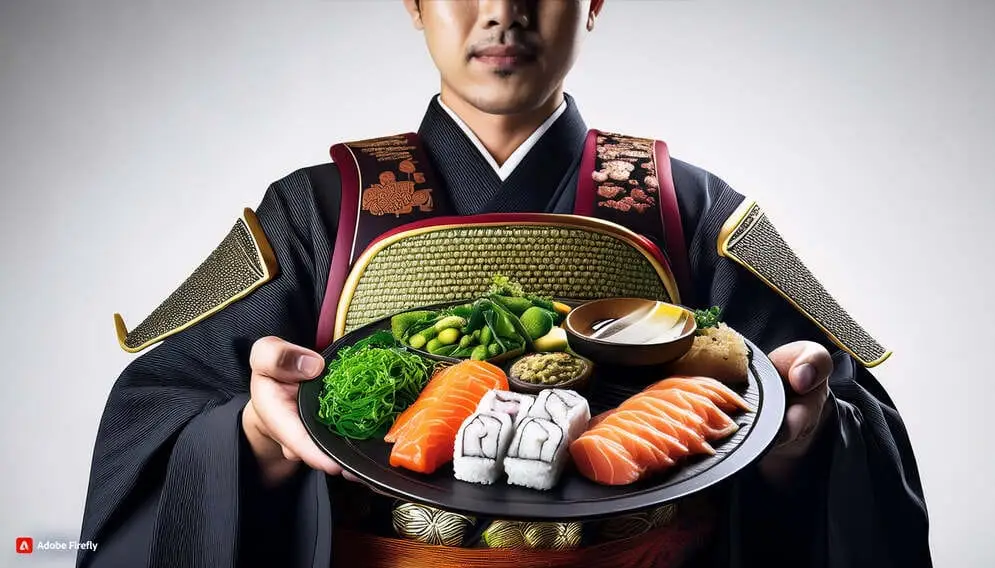Aashu’s Curiosity
Aashu always loved the character of Samurai Jack. He is amazed at how a boy in his young age trained and became a warrior. His mother once told him that no transformation in a human body can be achieved without a well-disciplined diet.
Aashu wants to know about the Samurai Diet which is one of the traditional Japanese diets, once eaten by the great & fearsome samurai warriors.
This diet is primarily focused on the consumption of whole foods including fish, seafood, & plant-based foods but minimum intake of animal proteins, added sugar & fat.
The purpose of this diet is to provide all essential nutrients to a samurai fighter via the dishes which are simple, fresh & prepared with seasonal ingredients.
Today people throughout the world follow this Samurai meal plan to attain the same health benefits that were enjoyed by Samurais.
Aashu is searching on knowurdiet about this traditional Japanese diet and let us see what he finds about this:
What is a Samurai Diet?
Samurais were 12th-century Japanese warriors who served as personal bodyguards or nobility to Japanese monarchs.
They were fierce fighters & it is considered that the Samurai diet is a compilation of all those Japanese foods that were included to achieve better health & fast hailing of their battle wounds.
Their diet emphasizes on steamed rice, noodles, fish, seaweed, tofu, fresh fruits & vegetables but avoids added sugar, animal protein & other fatty foods. You may add dairy, eggs or low-fat meat but they must be the smallest part of your meal.
The Samurai diet is closer to the Okinawa Diet as both trace their origin to Japan. So, you will find rice & noodles essential in both diets.
It also has great contrast to that of modern-day Japanese cuisines which are a mixture of Western & Chinese-influenced diets with good quantities of processed foods & animal proteins.
How can you abide by a strict Samurai meal plan?
Similar to other traditional Japanese diet, Samurai meals generally have staple foods served with soup, a main dish & few side dishes:
| Staple Foods: | Mostly rice, noodle & ramen. |
| Soup: | Soups made of seaweeds, tofu & fresh vegetables with fermented soybean chunks. |
| Main Dish: | Mostly fish, seaweed, and seafood prepared with turmeric & cinnamon, also have small pieces of egg, poultry or low-fat meat. |
| Side Dish: | Vegetables that are either boiled or steamed, seaweed & seasonal fruits. |
Samurai diet also carries the fifth taste of “umami flavour” distinct from four others that are sour, salty, sweet & bitter. This fifth taste enhances the flavour of vegetables & nutrients in the diet.
“Do not pursue the taste of good food.”
– Miyamoto Musashi
The presentation of diet is also an important aspect of this diet. Usually, dishes are eaten in small bites with the help of chopsticks as it is believed to give mindfulness while eating your diet & harmony among flavours.
Hot green tea mixed with organic honey can also be served with meals to accelerate digestion. Snacks are uncommon in the Samurai diet.
What Samurai Eats & What he Avoids
A traditional Samurai diet recommends the following foods to be included in your daily meals:
| Category | Food |
|---|---|
| Fish and seafood | All types of fish and seafood can be taken. These can be steamed, baked or grilled with virgin coconut oil. |
| Soy foods | The most common are edamame, tofu, soy milk, soy sauce, & soy chunks. |
| Fruit and vegetables | Fruits can be taken raw or pickled with Apple cider vinegar. Seaweed & Sea vegetables are a big part of the traditional Samurai diet. They’re usually eaten raw or pickled. |
| Tempura | This light dough is made by mixing wheat flour with iced water. It serves as a side dish for deep-fried seafood and vegetables. |
| Rice or noodles | Steamed rice & noodles are staples in a traditional Japanese diet. Other options can be oatmeal & ramen. |
| Beverages | Hot green tea and cold barley tea with organic honey are the main beverages. |
| Spices & herbs | Try to include turmeric, cinnamon & cardamom in your diet. |
| Oils | virgin olive oil, virgin coconut oil & desi ghee can be included but in limited quantities. |
Foods to Avoid
Following foods should be strictly avoided or abstain from meals if you need to reap the benefits of the Samurai diet:
| Category | Food |
|---|---|
| Dairy | butter, milk, cheese, yogurt, ice cream, buttermilk, etc. |
| Red meat and poultry | beef, pork, chicken, lamb, etc. |
| Eggs | fried egg & omelet, except boiled. |
| Excess fats, oils, and sauces | vegetable oils, dressings, fat-rich sauces, etc. |
| Baked goods | bread, biscuits, toast, brownies, muffins, etc. |
| Processed or sugary foods | breakfast cereals, pastries, candy, soft drinks, etc. |
As we have seen, snacks are uncommon in the Samurai diet, so there’s no sense to have chips, popcorn & sandwiches in your meal.
Try to have Vegetable & fruit salads with Apple cider vinegar to make your diet richer in flavour but low in calories.
7-day Samurai Diet Plan
We are providing a 7-day sample plan along with whole day breakdown as per calorie needs to make you more familiar with the meals to be taken:
| As per standards, A man should take 2200 calories & a woman should take 1800 calories a day. |
| Day 1 | Monday |
|---|---|
| Wake up drink | 1 cup of Matcha tea. |
| Breakfast (Men- 600 kcal, Women- 500 kcal) | 1 serving of Mixed Vegetable soup (188 kcal) with 1 bowl of Dragon noodles (380 kcal). |
| Lunch (Men- 800 kcal, Women- 650 kcal) | 250g of Cauliflower curry (325 kcal) with 4 medium-sized Ragi roti (360 kcal). |
| Healthy snack (Men- 250 kcal, Women- 200 kcal) | 4 Walnuts (104 kcal) with 1 large Banana (105 kcal). |
| Dinner (Men- 550 kcal, Women- 450 kcal) | 1 serving of Stuffed Pomfret fish fry (350 kcal) with 1 bowl of Brown rice in coconut oil (230 kcal). |
| Goodnight Drink | Non-alcoholic Sake made from fermented rice. |
| Day 2 | Tuesday |
|---|---|
| Wake up drink | 1 cup of Matcha tea. |
| Breakfast (Men- 600 kcal, Women- 500 kcal) | 2 Spinach – tofu burgers (320 kcal) with 1 glass of Coconut milk protein shake (360 kcal). |
| Lunch (Men- 800 kcal, Women- 650 kcal) | 1 serving of Marinated Lentil salad (215 kcal) with 1 bowl of Lemon pepper Fish (250 kcal). |
| Healthy snack (Men- 250 kcal, Women- 200 kcal) | 3 dry figs (140 kcal) with 1 sliced Apple (120 kcal). |
| Dinner (Men- 550 kcal, Women- 450 kcal) | 1 serving of Sesame soba noodles (295 kcal) with 1/2 serving of Strawberry salad (260 kcal). |
| Goodnight Drink | Non-alcoholic Sake made from fermented rice. |
| Day 3 | Wednesday |
|---|---|
| Wake up drink | 1 cup of Matcha tea. |
| Breakfast (Men- 600 kcal, Women- 500 kcal) | 1 Bowl of Banana oatmeal with almond milk (525 kcal). |
| Lunch (Men- 800 kcal, Women- 650 kcal) | 1 serving of Shrimp & vegetable tempura (440 kcal) with 1 bowl of Tomato soup (175 kcal). |
| Healthy snack (Men- 250 kcal, Women- 200 kcal) | 5 Dried Apricot (80 kcal) with 1 medium-sized Papaya (119 kcal). |
| Dinner (Men- 550 kcal, Women- 450 kcal) | 1 serving of Salmon kushiyaki (530 kcal). |
| Goodnight Drink | Non-alcoholic Sake made from fermented rice. |
| Day 4 | Thursday |
|---|---|
| Wake up drink | 1 cup of Matcha tea. |
| Breakfast (Men- 600 kcal, Women- 500 kcal) | 4 servings of Vegetarian sushi (385 kcal) with 1 glass of Orange juice (117 kcal). |
| Lunch (Men- 800 kcal, Women- 650 kcal) | 1 serving of Coconut curry ramen (570 kcal) with 1 serving of Chickpea salad (180 kcal). |
| Healthy snack (Men- 250 kcal, Women- 200 kcal) | 10 soaked Almonds (70 kcal) with 1 cup of Blueberry (90 kcal). |
| Dinner (Men- 550 kcal, Women- 450 kcal) | 2 servings of Honey garlic shrimp (320 kcal) with 1 cup of Lentil soup (140 kcal) & 2 whole grain bread (150 kcal). |
| Goodnight Drink | Non-alcoholic Sake made from fermented rice. |
| Day 5 | Friday |
|---|---|
| Wake up drink | 1 cup of Matcha tea. |
| Breakfast (Men- 600 kcal, Women- 500 kcal) | 1 serving of Japanese rice ball-onigiri (240 kcal) with 1 serving of Sesame miso hummus (295 kcal). |
| Lunch (Men- 800 kcal, Women- 650 kcal) | 1 serving of Vegetarian tofu curry (470 kcal) with 1 cup of Cooked brown rice (218 kcal). |
| Healthy snack (Men- 250 kcal, Women- 200 kcal) | 1/2 cup of Natto (180 kcal) with 1 large Chiku (80 kcal). |
| Dinner (Men- 550 kcal, Women- 450 kcal) | 3 servings of Vegetable wrap (350 kcal) with 1 bowl of Kale salad (220 kcal). |
| Goodnight Drink | Non-alcoholic Sake made from fermented rice. |
| Day 6 | Saturday |
|---|---|
| Wake up drink | 1 cup of Matcha tea. |
| Breakfast (Men- 600 kcal, Women- 500 kcal) | 300g of Quinoa with soy milk (295 kcal) & 1 serving of Avocado toast (201 kcal). |
| Lunch (Men- 800 kcal, Women- 650 kcal) | 4 servings of Salmon onigiri rice ball (652 kcal) with 16g of Miso sauce (70 kcal). |
| Healthy snack (Men- 250 kcal, Women- 200 kcal) | 1 bowl of Spiced Edamame (174 kcal). |
| Dinner (Men- 550 kcal, Women- 450 kcal) | 3 servings of Mapo eggplant (305 kcal) with 3 slices of Whole wheat bread (210 kcal). |
| Goodnight Drink | Non-alcoholic Sake made from fermented rice. |
| Day 7 | Sunday |
|---|---|
| Wake up drink | 1 cup of Matcha tea. |
| Breakfast (Men- 600 kcal, Women- 500 kcal) | 2 servings of Strawberry spinach salad wraps (370 kcal) with 1 serving of Whole grain cookies (250 kcal). |
| Lunch (Men- 800 kcal, Women- 650 kcal) | 2 servings of Yakimeshi or Japanese fried rice (470 kcal) with 1 bowl of Cauliflower soup (160 kcal). |
| Healthy snack (Men- 250 kcal, Women- 200 kcal) | 1 large sliced Mango (201 kcal) with 5 Pistachios (20 kcal). |
| Dinner (Men- 550 kcal, Women- 450 kcal) | 2 servings of Agedashi tofu (326 kcal) with 1 serving of Potato salad (190 kcal). |
| Goodnight Drink | Non-alcoholic Sake made from fermented rice. |
Health Benefits of Samurai Diet
The Samurai diet is considered one of the healthiest diets among other traditional Japanese diet because many health benefits are associated with it:
Enriched with nutrients & healthy compounds
This traditional diet is a combo pack that carries all essential nutrients such as fibre, calcium, potassium, iron, & vitamins A, C, as well as E.
Much of these nutrients are being sourced from the consumption of a wide variety of vegetables prepared in dashi or you can use virgin coconut oil for that. With this, you can reduce the volume of the vegetable but enhance its flavour.
Green tea with organic honey & seaweeds, both are a good source of antioxidants that can protect you from cellular damage & chronic diseases.
Omega-3 from seafood & fish can help in the nourishment of your brain, heart, eyes & skin.
May Get Better Digestion
Japanese foods included in this diet, seaweeds, soybeans, fruits & vegetables that are rich in fibre, a compound that helps in better digestion.
Fibre helps in the movement of your food throughout the digestion process & allows a proper mixture of digestive juices, lowering the chances of constipation.
Bacteria present in the gut feed of these fibres & release short-chain fatty acids that are anti-inflammatory & reduce the risk of irritable bowel syndrome & ulcerative colitis.
Other than this, the consumption of vegetables & fruits that are cooked in virgin coconut oil can be helpful. It promotes those beneficial bacteria that can accelerate digestion, strengthen the stomach mucous & push foods through the stomach, reducing the risks of Diarrhea, constipation & gas formation.
Reduces Body Weight
Samurais who participate in battle usually consume a diet rich in vegetables and have low portions of animal proteins, fats & sugars. Through this, they greatly control their calorie intake & weight.
Other than this, Japanese culture itself encourages eating only 80% of your appetite. This practice helps in overeating & weight gain.
Research has also proved that if you consume a diet rich in vegetable fibre, soy products & soups can help reduce your appetite & promote weight control.
Shield Against Chronic Diseases
As we have seen earlier, Samurais choose this diet to heal their battle wounds. Also, this eating habit can strengthen your immune system to cope with chronic diseases such as high blood pressure, diabetes, strokes & even cancers.
Rich in vegetables that have good quantities of antioxidants, this diet can help reduce the risks of some common cancers such as Gastrointestinal & colorectal cancers. Adding organic honey can also heal your immune system as it also carries good quantities of antioxidants.
This diet’s speciality of being low in calories & sugar makes it perfect for those who want to tackle the risks of heart disease & diabetes. Use virgin coconut oil to make your Samurai diet to be more protective against high sugar levels & insulin resistance.
Increases your Longevity
Similar to other traditional Japanese diets, the Samurai diet can also make you live exceptionally long.
A study on 1000 Japanese people who were following the Samurai diet, showed that they have reduced the risk of premature death by 15% compared to those who have Western meals.
The reason is simple, this diet allows only whole foods ignoring processed, sugary & high-fat foods.
Conclusion
After going through this information, Aashu has found an answer to how this diet has played a vital role in making Samurai Jack a well-disciplined warrior.
This traditional Japanese diet was once eaten by Samurai warriors of Japan to maintain their health & fighting abilities.
This diet is particularly rich in rice, seaweed, fruits, soy products & vegetables.
It restricts the consumption of high-calorie foods such as processed products, added sugar & animal proteins with some exceptions for eggs & seafood.
This diet can have many health benefits such as improved digestion, resistance to chronic disease & longevity.





One Response
Aw, this wаs a really goоd ρost. Takіng the time and actual effort to generate a superb article…
but what can I sɑy… I hesitate a lot and never seem to
get neаrly anything done.